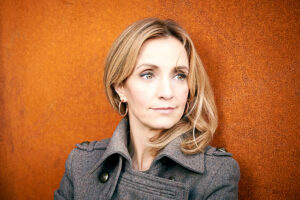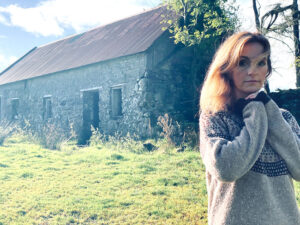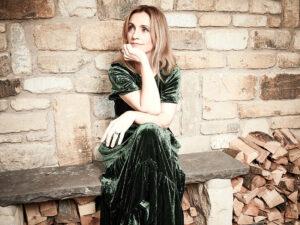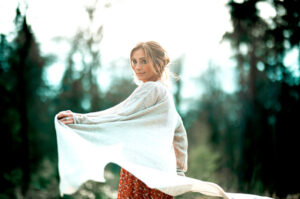
Well known folk singer Cara Dillon told David Hennessy about her most personal album yet based on her original poetry that ponders personal memories of her native Co. Derry and the people that made her.
Well known Derry folk singer Cara Dillon is about to release her brand new album and book, both titled Coming Home.
The album is Cara’s first collection of entirely original material and brings to life intensely personal memories of her native Co. Derry and the people, places, and customs that have shaped her.
The book also features Cara’s original poetry and lyrics, as well as personal stories and anecdotes.
Few Irish singers are as revered as Cara Dillon.
She has sung with the likes of De Dannan and Óige.
Ed Sheeran, Ellie Goulding, and Sam Smith are among her celebrity fans.
As Mojo magazine says, Cara Dillon has ‘quite possibly the world’s most beautiful female voice’.
It was in lockdown that Cara took to writing poetry. It was never meant to be for anyone else but Coming Home is an album that finds her reflecting on the personal and exploring themes of family, cultural identity and home.
Does this one feel very different to previous releases for how personal it is?
Cara told The Irish World: “Yeah, it feels amazing.
“I think I can honestly say I’m more proud of this than anything I’ve ever done before and I think that’s because it’s just coming from a really honest place.
“I think it’s that connection that I’m having already with the people who’ve been coming to our concerts and are enjoying the stories.
“They’re coming up afterwards and they’re telling me so many amazing things that my head’s spinning sometimes.
“I never set out to do it for any purpose other than to just scribble down my thoughts during lockdown.
“I’m kind of blown away that I’ve even got a book.
“I never intended anybody to read the poems, let alone get to this stage.”
Cara describes in the book how she never intended to do anything with the poems she started writing in lockdown but hearing them with some of her husband Sam’s guitar strumming gave her the idea.
“It all happened very naturally.
“For about two weeks that first spring (of lockdown), I just couldn’t sleep anytime beyond four in the morning.
“But after about two weeks of that I just thought, ‘To hell with this. I’m gonna get up at four o’clock in the morning’.
“I just sat in the garden and that’s when all these poems just came.
“I felt more connected to home ironically, even though I couldn’t get there.”

Cara lives in Somerset with her musician husband Sam Lakeman and three children.
“I suffer from home sickness a lot but out of that has come this lovely piece of work which I’m very proud of.
“You see things in a different way, you see it (home) in a different light.
“You kind of miss the tenderness of what home means to you.
“I was delighted that when Sam heard a couple of the poems he didn’t sort of go, ‘What are you doing?’
“And he was, ‘This is lovely, you should do something with that’.
“And I said, ‘Never, this is just for me, I just thought I’d read it out to you’.
“But then as the months went on, I just found myself humming over some little tunes.
“He’s always noodling in the background on his guitar anyway.
“It seemed like they just wanted to be heard over the top of the music.
“So it all came about very naturally like that.”
What have the reactions to Coming Home been like?
“This is the reason the book came along, because I did Coming Home and I said to the audience, ‘I know you’re all here to hear me sing, I hope you can just bear with me. I’d like to try something else out. I’ve been writing these poems. I’d like to try it out and see if it’s something that anybody feels a connection with…’
“And I did it but I explained the background to the poem.
“I talked about how we were away at the other side of the world and how I was home sick and my father and all the rest of it.
“And then we did the poem to the music.
“In my whole career, I’ve never had a reaction like that ever.
“And later that night, people were telling me stories about their father, their mother or things that have happened to them.
“It was so overwhelming.
“And then they said to me, ‘Please write down that story because it’s kind of helped us understand where you’re coming from with the poem’.”
In the book Cara tells of her childhood memories of going through border patrols and being subjected to British army searches when the family were either travelling to or returning from holidays in Donegal.
She also recounted when she travelled to England with her teenage band Óige and they mistook the fact that there were no news of bombings, beatings or killings on the news in mainland UK to mean that the violence in Northern Ireland had come to an end.
“When I was growing up in Dungiven, it (the troubles) was just normal.
“I wrote in the book about being in Óige and coming over to England.
“The news came on and we were just like, ‘Oh, it’s all ended. There’s nothing’s going on’.
“It was just people talking about random things that were not like our kind of news’.
“We were all 16, 17 but we just thought, ‘It’s over. This is incredible’.
“And then of course, we get back into the port of Belfast and we’re just like, ‘Oh my god, it’s not over. It’s just exactly the same’.
“But even with that, that was home.
“You were coming back to that and you just accepted the Land Rovers and the guns and all of it.
“I think I only wrote about it because my twin boys just turned 17 so they were 16 when I was writing this stuff.
“I remember sitting with them one day, and I said, ‘When I was your age, I was in this wee band called Óige and we used to play to earn a bit of pocket money’.
“And then I was looking at them and I was thinking to myself, ‘And when I was your age, I was going to school and I was stepping over soldiers in our garden’.
“And then I started thinking, ‘That’s not normal’.
“You sort of see through another generation’s eyes.
“I also said that my actual childhood, I didn’t suffer.
“I didn’t experience any of that.
“We were very much all shielded and protected and saw the Good Friday Agreement and the hope for the future.
“I’m one of the ones that experienced the greatest times so I can’t really in any way compare it to what my parents or aunts, uncles, and even my elder sisters, what they went through.”
The book and album also see Cara relive the trauma of having her twin boys at just 26 weeks and being told that they were unlikely to survive. Once again, they did and are now 17 years old.
“I could have written a whole book about that experience alone.
“I know myself that it’s really important to be able to talk about things like that.
“Because there’s so many other people that are going through stuff like that and they need to know that it’s okay to talk about it.
“And things can get better, everything can work out.
“It’s not that long ago, they’re 17 now but even when they were little, I think I probably had a wee bit of PTSD because I didn’t know that you could actually just go and talk to people about stuff like that, you just got on with it.
“But actually I feel like if anybody was to open my book and was feeling in any way unsure or unhappy about their whole experience that they would know to go and speak to somebody.”

You do also write about the time you were on the A Woman’s Heart tour with big names like Sharon Shannon and Mary Black and on hearing that your father wasn’t well, the tour bus took a detour so you could have some precious moments with your father while Mary Coughlan, Dolores Keane and more stretched their legs in the front yard…
“Oh my god. Honestly I’ve got loads of stories about being on the road but that one in particular always comes into my head at the most random times.
“The kindness of those women.
“They knew what to do, ‘Yep, we’re on the road and we’re doing these concerts and it’s important that people come out to see the show. And you know what? It’s also important that maybe the sound check’s going to be 45 minutes late this evening because Cara needs to see her daddy because this is very, very sensitive and he’s not making it’.
“And you just think to yourself, ‘Thank God that I was surrounded by people like that who know what’s important in life.
“It was a really incredible moment.
“I’ll never forget the state of them all stretching and creaking their neck and doing a wee bit of almost like yoga outside our house, and me just thinking, ‘Oh my God, what are our neighbours gonna be thinking? My mother’s gonna kill me for not telling them to come in’.
“She was mortified that I would just leave them standing outside.”
You write in the book about performing in Sicily with Mount Etna erupting in the background.
Music has given you so much, hasn’t it?
“Just incredible.
“On the way back from Sicily I said to Sam, ‘Oh my gosh, if we never went on another trip in our lives, wasn’t that just incredible?’
“And then we discovered we’ve got a huge fan base in China and we spent years going there with super fans and 2,000 seater sell out shows.
“You just think, ‘What else is going to happen in a lifetime?’
“So you never know, you just have to go with the flow and be open minded and see where the magic of life takes you.”
You say you didn’t have any training but you grew up with the Fleadhs and were a real ‘Fleadh baby’, that was where you learned, wasn’t it?
“Oh, it was a huge part of my life.
“I have to say it was my mother.
“I owe all of that to her because she would just drive all over the country to all the Fleadhs.
“It’s where I realised the power of the voice because I saw how when there’s a session in full swing and the craic’s great when somebody starts singing a song, it doesn’t even have to be somebody singing it perfectly in tune, it’s the delivery of it.
“It’s like a meeting of souls.
“The silence in a room is just haunting and I realised that at a very young age: That something profound happens in a situation when people are together and they sing an old song that tells a story about us as a people and what we’ve gone through and our ancestors, what they’ve done and emigration.
“It’s really powerful stuff.”
One thing that surprised me reading the book was- and it came in the same chapter that you described that incredible experience of Mount Etna- when you said that without your husband Sam, you would have walked away from music long ago…
“Yeah, 100%.
“Somebody asked me the other day, ‘Would you do anything differently?’
“And the only thing I think I would do differently is I would stand up for myself in lots of different situations.
“Sam’s from the wilds of Dartmoor and me from a one horse town in County Derry: You’re brought up well, you respect people, and you defer to older people.
“You want to do your best but sometimes other people have got different ideas.
“Some people are there to take your money, some people are there to rinse the system.
“And there is no way I could have done any of it without Sam.
“I don’t know whether it’s just because it wasn’t just dabbling in folk music or anything like that.
“We were playing with the big boys.
“We were signed to Warner’s for a while and then Rough Trade.
“Yeah, (without Sam) I’d have given up a long time ago.”
We’ve mentioned that Mount Etna thing a couple of times but are there other highlights that leap out for you?
“One instantly just comes to mind.
“I’m standing in Abbey Road with a 90 piece orchestra and recording the Disney soundtrack (for the film Tinker Bell and the Great Fairy Rescue).
“And then four American Disney producers in the control room ask me to come up for a chat when I’d recorded the song.
“It was so surreal.
“They said, ‘We love the song. We love what you’ve sung but we also like your speaking voice and we’d love you to narrate the opening sequence of the movie’.
“I just remember sitting there thinking, ‘What? Half the time people don’t understand me and are going, where are you from? What accent is that?’ Or, ‘Can you slow down?’
“I just thought it was funny and huge and magical.
“But there’s been far too many.
“I’ve been so blessed.
“It’s always hard to pick a moment, sometimes it can be just a moment you share with someone who welcomes you back to their house after a concert and you hear some amazing story about how they came to your music that blows your mind.”
 You also write about your diabetes. It’s something you have managed for years and write in the book about how people search for or believe in ‘cures’. Was it important to include that?
You also write about your diabetes. It’s something you have managed for years and write in the book about how people search for or believe in ‘cures’. Was it important to include that?
“Like the story of the twins’ arrival, there could be a whole book on diabetes.
“There really could.
“That’s something a lot of people suffer with nowadays.
“I understand how tough that particular fate is.
“It’s probably one of the worst things that has ever happened to me and also probably one of the best because you learn so much from having a chronic disease.
“You have to really learn to look after yourself when you’re on the road.
“So it’s good for your health but it is a daily chore and it is not easy.
“It’s nice to talk about things like carrageen moss and the different things that can help you but what we need is a proper cure.
“We need a proper cure that medicine and the scientists can come up with because it’s a really tough one.
“There’s no point in me saying ‘it’s grand’.
“I’ve done that too much in the past.
“Ten years ago, and I was only a diabetic for two years at that point, I used to get asked about it all the time and I used to go, ‘Oh, it’s fine. No, no, no, it’s fine’.
“It’s not fine. It’s a daily chore and a daily struggle because it’s up and down.
“When I sing, the adrenaline of the excitement of going on to perform makes your blood sugars extremely high and then after a concert, you can crash and have hypos.
“It’s not easy to be a performer.
“I suppose any job’s not easy with it.”
Is it emotional to sing the material from Coming Home? “It is. We did the Grand Opera House in Belfast in October.
“I got really, really, really emotional when I did the Coming Home piece.
“Nobody would have known but there was definitely tears coming down my face at one point because the music was so beautiful.
“The sad thing was you’ve written something about your father, and he’s not there.
“I just felt the enormity of everything our parents have done for us and gave us and I was standing on this huge stage.
“It’s like a dream come true to sell out the Opera House and to have that special moment.”
Coming Home, the album and the book, is out on 15 March.
Cara Dillon is on tour from 8 March- June.
For more information, click here.


